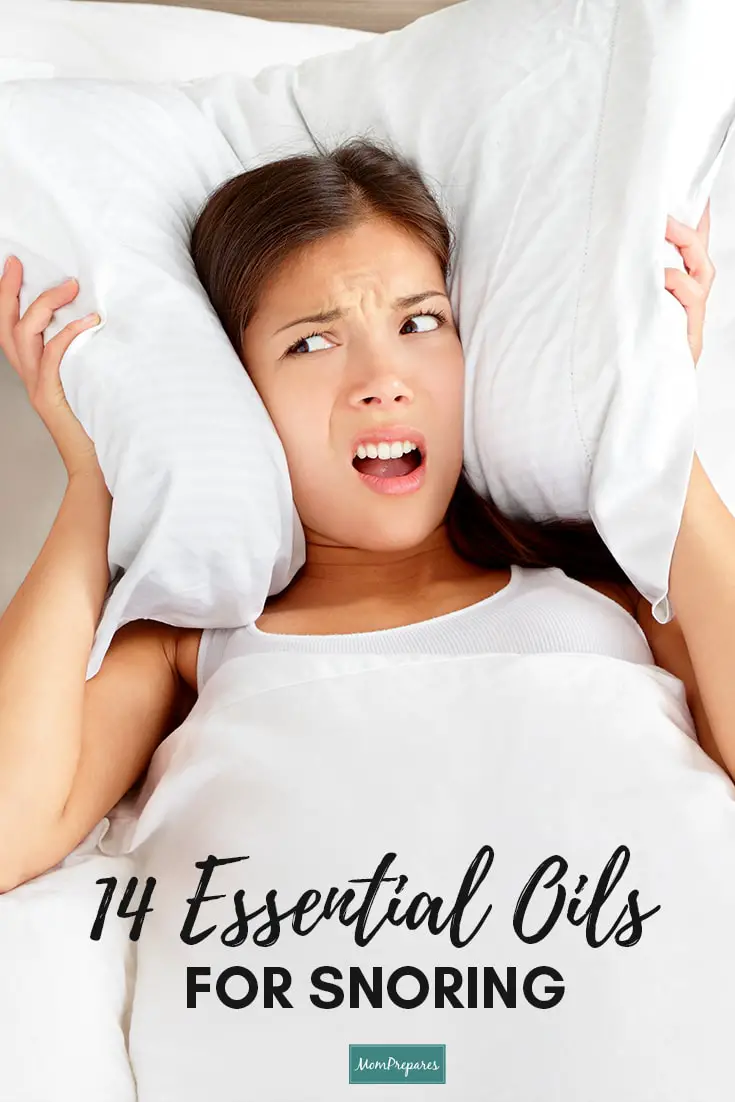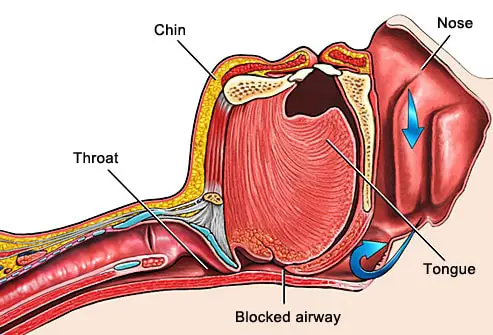Snoring affects 90 million people in the United States, including 37 million people on a regular basis.
Most people don’t know the exact reason for their snoring, much less the medical terminology.
But when you’re lying awake at three in the morning for the umpteenth night in a row thinking up ways to strangle your partner without killing them, do you really care?
Or maybe it is you who wakes up with an extra-strong snort in the middle of the night and realizes that your spouse is not next to you.
When you find them, they’re on the couch again with that same annoyed glare.
If you’re desperate for some snoring relief, then this is the article for you. We’re going to help you discover the best essential oils for snoring and help you get back to refreshing, snore-free nights again!

What causes snoring?
Snoring is caused by the narrowing of the throat and relaxation of muscles including the tongue. Breathing causes vibrations, which causes the sound that occurs on inhalation and, to some degree, exhalation.

This phenomenon can be caused or aggravated by multiple things:
- Aging
- Alcohol
- Allergies
- Being overweight
- Deviated septum
- Enlarged adenoids
- Enlarged tonsils
- Muscle relaxants
- Nasal polyps
- Respiratory infection
- Sleeping on your back
- Smoking
This is not an all-inclusive list. While snoring is a considerable nuisance, it can also be a hazard to your health. In extreme cases, relaxed muscles can close the airway, or the brain will stop sending signals to breathe.
Both of these can hinder breathing to the point where it completely stops. This is either obstructive or central sleep apnea, respectively.
In rare situations, these can occur in tandem, which is known as complex sleep apnea syndrome (CompSA). Any type of sleep apnea can be life-threatening, usually due to secondary issues the disease can cause like heart problems, stroke, or even vehicular accidents because of sleep deficit.

Some of the symptoms of sleep apnea include:
- Being told you stopped breathing in your sleep
- Dry mouth when you wake up
- Exhaustion even though you got enough sleep
- Headache upon waking
- Hypersomnia (abnormal daytime sleepiness)
- Inability to pay attention during the day
- Insomnia (can’t fall asleep/stay asleep)
- Moodiness and irritability
- Waking up gasping for air
If any of these apply to you, consult your doctor. This is a serious condition.
Some of the regularly recommended treatments for snoring are:
- Change your pillows every six months.
- Keep nasal passages open by taking a hot shower, trying snoring strips, or using a neti pot before bed.
- Lose weight.
- Quit smoking.
- Reduce alcohol intake.
- Stay hydrated.
- Try not to wait until you are overtired to go to bed.
- Wash your bedding more frequently.
It may take following a couple of these snoring protocols in tandem to help, depending on your situation.
If snoring is causing serious health problems, the more drastic measures to help the situation are:
- Continuous positive airway pressure (CPAP) machines that prevent collapse by blowing air into the throat during sleep
- Dentist-constructed devices designed to keep the airway open, like nasal dilators or oral devices
- Surgery on the back of the throat, nose, or roof of the mouth
However, for regular bouts, treating snoring with essential oils and aromatherapy is not difficult.
The following information is for use on adults, not children. Asthmatics, those with diabetes, epilepsy, women who are pregnant or nursing, or anyone on multiple medications, should always research what oils are safe for them to use.
Always do a skin patch test as any oil has the potential to irritate the skin. This is especially true for those who have sensitive skin.
What essential oils are good for snoring?
When it comes to treating snoring with essential oils, you want to find those that work well on throat and respiratory issues, especially mucolytics, decongestants, and expectorants. Those that help with inflammation and that are antispasmodic could be helpful as well.
Going by those parameters, essential oils that help with snoring would be those containing phenols, especially 1,8 cineole (eucalyptol) or thymol, as well as a mix of other phytochemicals like ketones, monoterpenes, and sesquiterpenes.
That would make these the best essential oils for snoring:
- Cypress (Cupressus sempervirens) – Antispasmodic, antitussive, astringent, vasoconstrictor
- Eucalyptus (Eucalyptus spp.) – Analgesic, anti-inflammatory, antispasmodic, antitussive, expectorant (E. radiata or E. smithii are the safest)
- Fennel, sweet (Foeniculum vulgare var. dulce) – Anti-inflammatory, antispasmodic, expectorant, spasmolytic
- Lavender (Lavandula angustifolia) – Analgesic, anti-inflammatory, antiseptic, calmative, sedative, soporific, spasmolytic
- Lemon (Citrus limon) – Antiseptic, antispasmodic, astringent, calmative
- Marjoram (Origanum majorana) – Analgesic, antispasmodic, calmative, sedative
- Myrrh (Commiphora myrrha) – Anti-inflammatory, astringent, expectorant
- Peppermint (Mentha piperita) – Analgesic, anti-inflammatory, antispasmodic, decongestant, expectorant
- Pine (Pinus sylvestris) – Decongestant, expectorant
- Rosemary (Rosmarinus officinalis) – Analgesic, antispasmodic, decongestant, spasmolytic
- Spearmint (Mentha spicata) – Calmative, decongestant, spasmolytic (safer and less harsh than peppermint)
- Spikenard (Nardostachys jatamansi) – Analgesic, anti-inflammatory, calmative, sedative, soporific, spasmolytic
- Thyme linalol (Thymus vulgaris ct. linalool) – Analgesic, antispasmodic, expectorant (less harsh than common thyme oil (T. vulgaris)
- Yarrow (Achillea millefolium) – Anti-inflammatory, antispasmodic, astringent, expectorant
There are also custom blends by companies that are reported to be helpful. For instance, Young Living’s Valor® or Valor II® essential oil blends and RC® essential oil blend, as well as doTERRA’s Breathe®, have all been reported to be good for snoring, although we have not tried these essential oil brands ourselves.
How do I use essential oils for snoring?
There are numerous ways to incorporate essential oils for better sleep and ease snoring systems. While the oils are by no means a cure, research suggests that methods like gargling and throat sprays have been effective.
That does not mean you have to stick to these methods.
Bath and Shower
You can use the above oils or create a custom blend to use in the bath or shower.
For showers:
- Mix 3-5 drops in a carrier oil and stream it onto your washcloth. Starting at your legs, rub upwards toward your heart.
- Add five drops of the oil or blend to the shower floor, right beyond where the water falls, and inhale the steam.
For baths:
- Add your essential oil or blend to a teaspoon of carrier oil, Epsom salt, milk powder, or your preferred carrier and swish in your bath. Inhale deeply as you relax.
Diffuser
Diffusion is probably the easiest way to combat snoring with oils. This is the method recommended for those just starting out. Place drops of recommended oil or your personal blend into the diffuser and turn it on when you go to bed.
Facial Steaming
Facial steaming is relatively simple. Get a heat-resistant non-reactive bowl and place steaming water in it. Add 2-4 drops of your oil or blend.
Grab a towel, and place it over the back of your head. Lean over the bowl, making sure to keep a distance of about 12 inches between the steaming water and your face.
Inhale the vapors for 5-10 minutes. If you start feeling any side effects like coughing, dizziness, or nausea, stop immediately.
This method has the added benefit of being excellent for your face!
Gargle
Gargling an essential oil mix before bed can be effective, and research has shown that a product on the market reduced snoring in patients by 77%!
You can use the recipe below or create your own. Either way, make sure you do not swallow it.
Anti-snore Gargle:
- 2 drops Lavender (Lavandula angustifolia)
- 2 drops Lemon (Citrus limon)
- 2 drops Peppermint (Mentha piperita)
- 2 drops Pine (Pinus sylvestris)
- 2 drops Thyme linalol (Thymus vulgaris ct. linalool)
Add this mix to two cups of distilled water in a sealable glass container. To use, take a tablespoon of the water and gargle for 30-60 seconds, making sure not to swallow any. Spit out. This recipe is approximately 32 servings, so it should last you all month. Be sure to refrigerate your blend.
Massage
Massages are extremely relaxing and can help you drift off to a peaceful sleep. With the right combination of oils and the correct application, it can help you snore less too.
Massage Oil Blend for Snoring:
- 5 drops Lavender (Lavandula angustifolia)
- 4 drops Thyme linalol (Thymus vulgaris ct. linalool)
- 4 drops Cypress (Cupressus sempervirens)
- 3 drops Eucalyptus (E. radiata)
Blend the above oils into 1½ tablespoons of a carrier oil like coconut (Cocos nucifera) or jojoba (Simmondsia chinensis).
You will want to concentrate the blend on your neck, chest, back, and bottoms of your feet.
Nasal Application
Choose one of the above oils, massage blend, or your own unique blend. Add one drop to two drops of carrier oil or aloe vera gel. Rub together in the palm of your hand to mix. Rub this under your nose before going to sleep.
Throat Spray
In the same study as mentioned above, a throat spray with an essential oil product already on the market reduced snoring in patients by a whopping 82%, beating out the gargle. You can make your own snore spray recipe at home instead of heading to the store.
You can use the recipe provided for gargling as a throat spray, or try this one:
- 4 drops Peppermint (Mentha piperita)
- 4 drops Lavender (Lavandula angustifolia)
- 3 drops Lemon (Citrus limon)
- 2 drops Eucalyptus (E. radiata)
- 2 drops Myrrh (Commiphora myrrha)
Add the above blend to two cups of distilled water in a glass spray bottle, preferably a dark one. After brushing your teeth, shake well and pump three times around the back of the throat. If that doesn’t work, you can pump up to three more times.
Do not eat or drink afterward for at least 30 minutes.
Thyme on Toes
Many people in the aromatherapy world recommend rubbing thyme around your big toes each night before bed. Be sure to combine it with a carrier oil; do not use it alone. Two to three drops of thyme to a teaspoon of carrier oil is sufficient.
Concentrate on the bottoms of the toes. The reason for this is that in reflexology, this area is considered to be related to the neck area.
Conclusion
Snoring can be a nuisance, and it usually will affect your partner more than it will you. However, besides being a strain on your relationship, it can be harmful to your health.
As you can see, you do have choices when it comes to choosing a snore remedy. Among these are various essential oils and methods to stop snoring, or at the very least, reduce it.
I hope you try the various snoring recipes provided. If you make up your own blend that worked or have a go-to favorite you have been using, let us know in the comments below.
Leave a Reply